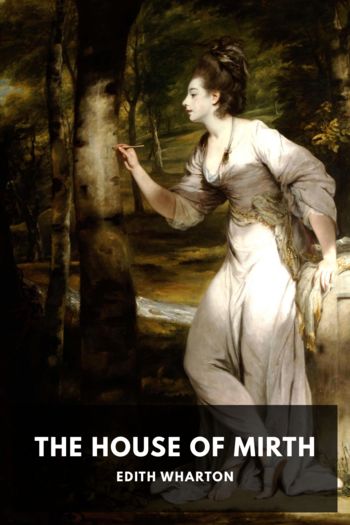The House of Mirth - Edith Wharton (phonics reader .txt) 📗

- Author: Edith Wharton
Book online «The House of Mirth - Edith Wharton (phonics reader .txt) 📗». Author Edith Wharton
Having finally discovered that the seat adjoining Miss Bart’s was at her disposal, she possessed herself of it with a farther displacement of her surroundings, explaining meanwhile that she had come across from Mount Kisco in her motorcar that morning, and had been kicking her heels for an hour at Garrisons, without even the alleviation of a cigarette, her brute of a husband having neglected to replenish her case before they parted that morning.
“And at this hour of the day I don’t suppose you’ve a single one left, have you, Lily?” she plaintively concluded.
Miss Bart caught the startled glance of Mr. Percy Gryce, whose own lips were never defiled by tobacco.
“What an absurd question, Bertha!” she exclaimed, blushing at the thought of the store she had laid in at Lawrence Selden’s.
“Why, don’t you smoke? Since when have you given it up? What—you never—And you don’t either, Mr. Gryce? Ah, of course—how stupid of me—I understand.”
And Mrs. Dorset leaned back against her travelling cushions with a smile which made Lily wish there had been no vacant seat beside her own.
IIIBridge at Bellomont usually lasted till the small hours; and when Lily went to bed that night she had played too long for her own good.
Feeling no desire for the self-communion which awaited her in her room, she lingered on the broad stairway, looking down into the hall below, where the last card-players were grouped about the tray of tall glasses and silver-collared decanters which the butler had just placed on a low table near the fire.
The hall was arcaded, with a gallery supported on columns of pale yellow marble. Tall clumps of flowering plants were grouped against a background of dark foliage in the angles of the walls. On the crimson carpet a deerhound and two or three spaniels dozed luxuriously before the fire, and the light from the great central lantern overhead shed a brightness on the women’s hair and struck sparks from their jewels as they moved.
There were moments when such scenes delighted Lily, when they gratified her sense of beauty and her craving for the external finish of life; there were others when they gave a sharper edge to the meagreness of her own opportunities. This was one of the moments when the sense of contrast was uppermost, and she turned away impatiently as Mrs. George Dorset, glittering in serpentine spangles, drew Percy Gryce in her wake to a confidential nook beneath the gallery.
It was not that Miss Bart was afraid of losing her newly-acquired hold over Mr. Gryce. Mrs. Dorset might startle or dazzle him, but she had neither the skill nor the patience to effect his capture. She was too self-engrossed to penetrate the recesses of his shyness, and besides, why should she care to give herself the trouble? At most it might amuse her to make sport of his simplicity for an evening—after that he would be merely a burden to her, and knowing this, she was far too experienced to encourage him. But the mere thought of that other woman, who could take a man up and toss him aside as she willed, without having to regard him as a possible factor in her plans, filled Lily Bart with envy. She had been bored all the afternoon by Percy Gryce—the mere thought seemed to waken an echo of his droning voice—but she could not ignore him on the morrow, she must follow up her success, must submit to more boredom, must be ready with fresh compliances and adaptabilities, and all on the bare chance that he might ultimately decide to do her the honour of boring her for life.
It was a hateful fate—but how escape from it? What choice had she? To be herself, or a Gerty Farish. As she entered her bedroom, with its softly-shaded lights, her lace dressing-gown lying across the silken bedspread, her little embroidered slippers before the fire, a vase of carnations filling the air with perfume, and the last novels and magazines lying uncut on a table beside the reading-lamp, she had a vision of Miss Farish’s cramped flat, with its cheap conveniences and hideous wallpapers. No; she was not made for mean and shabby surroundings, for the squalid compromises of poverty. Her whole being dilated in an atmosphere of luxury; it was the background she required, the only climate she could breathe in. But the luxury of others was not what she wanted. A few years ago it had sufficed her: she had taken her daily meed of pleasure without caring who provided it. Now she was beginning to chafe at the obligations it imposed, to feel herself a mere pensioner on the splendour which had once seemed to belong to her. There were even moments when she was conscious of having to pay her way.
For a long time she had refused to play bridge. She knew she could not afford it, and she was afraid of acquiring so expensive a taste. She had seen the danger exemplified in more than one of her associates—in young Ned Silverton, for instance, the charming fair boy now seated in abject rapture at the elbow of Mrs. Fisher, a striking divorcee with eyes and gowns as emphatic as the headlines of her “case.” Lily could remember when young Silverton had stumbled into their circle, with the air of a strayed Arcadian who has published charming sonnets in his college journal. Since then he had developed a taste for Mrs. Fisher and bridge, and the latter at least had involved him in expenses from which





Comments (0)